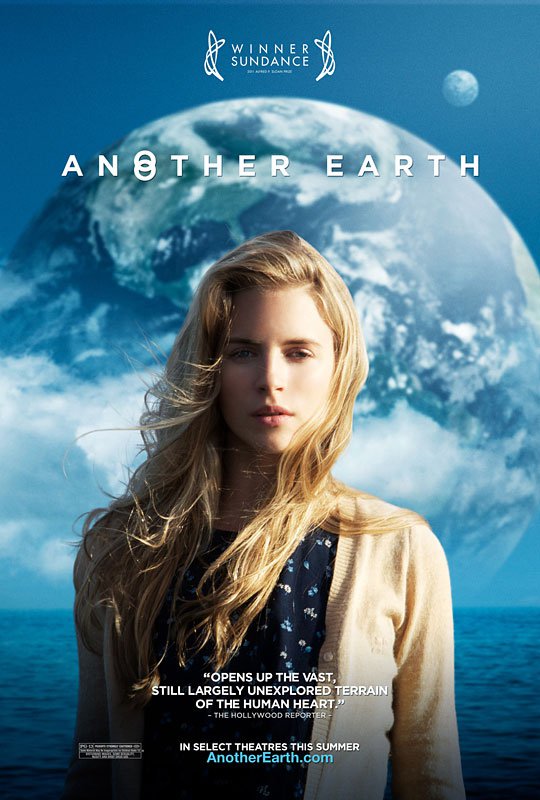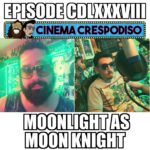 “Another Earth” is one of those little indie films that comes out of the film festival circuit with lots of buzz and good will and jury prize awards and what not, so by the time it hits the multiplexes (if it does at all), it’s already positioned as the new great film from some exciting new voices in cinema. Which makes it disappointing when the movie actually turns out to be kinda crappy, because if it were viewed without all of that positive word of mouth, then maybe it would have just been seen as an okay movie and a solid debut from an interesting young filmmaker. But instead, since it was positioned as the next Solaris or 2001: A Space Odyssey, expectations became too high and it gains extra scrutinization, and unfortunately “Another Earth” doesn’t hold up under the scrutiny.
“Another Earth” is one of those little indie films that comes out of the film festival circuit with lots of buzz and good will and jury prize awards and what not, so by the time it hits the multiplexes (if it does at all), it’s already positioned as the new great film from some exciting new voices in cinema. Which makes it disappointing when the movie actually turns out to be kinda crappy, because if it were viewed without all of that positive word of mouth, then maybe it would have just been seen as an okay movie and a solid debut from an interesting young filmmaker. But instead, since it was positioned as the next Solaris or 2001: A Space Odyssey, expectations became too high and it gains extra scrutinization, and unfortunately “Another Earth” doesn’t hold up under the scrutiny.
“Another Earth” is the story of a 17-year old high school graduate named Rhoda Williams (Brit Marling, who also co-wrote the story), and the movie starts with her celebrating her acceptance into MIT, which shows she’s a very smart person with lots of potential and promise. Rhoda immediately throws all of this potential and promise out of the window when she goes drunk driving after her celebration and ends up plowing into another car, putting a successful composer named John Burroughs (William Mapother, Mission: Impossible 2) into a coma and killing his young son and pregnant wife. Jump cut to four years later with Rhoda getting out of prison. She takes a job at her old high school as a janitor, she secludes herself from just about everyone else, and she sets out to make amends with John the composer. But when she goes to his home to apologize to him, she loses her nerve and makes up a story about being from a maid service, offering a free trial. And John, who is apparently now a drunkard and suffering from some brain damage, allows Rhoda into his home to clean.
And we’re off, with a story about regret and redemption and a somewhat silly set up that now has Rhoda trying to make John’s life better, all the while with the secret knowledge that she is the reason his life sucks now. It’s kind of a mopey and not-too-original redemption story, and really nothing new is offered from this set up or the resolution. So where is this positive buzz coming from? Why do people care about this movie so much?
Because of a thought-provoking sci-fi premise crudely heaped upon the redemption story, masking the familiarity with an unearned air of philosophical weightiness. On the night of Rhoda and John’s fateful encounter, a giant blue star appeared in the sky above Earth. By the time Rhoda got out of prison, this star was close enough for people to realize that it was another version of their planet, staring them right in the face. This new Earth is named Earth 2. One character wonders aloud if the people on the other Earth call themselves Earth 2. And three or four times Rhoda walks along the beach in slow motion while Earth 2 hangs ominously in the background and a random radio or television (or internet?) broadcaster waxes poetic about how we have doppelgangers on this other Earth, possibly making the same decisions and mistakes we make.
But this idea is not connected to the main story in a truly meaningful way – the whole plot of “car accident leading to loss and regret leading to redemption” could have been told in the same exact way with or without Earth 2. Just because you throw in a few showy shots with a voiceover recalling college freshman level philosophy presentations doesn’t mean you have a well-made science fiction movie. Rhoda didn’t need to stare at another Earth in the sky and contemplate the existence of another version of herself to come to the conclusion that she made a mistake and has to live with that and move on. She should have come to that conclusion no matter what, given how smart she’s supposed to be and all.
Which means “Another Earth” hinges on the central story alone, and this story isn’t unique or compelling enough to really pull the whole thing off. The plot mechanics feel forced, especially since it’s one of those annoying story contrivances in which one character withholds important information from the other only until the script calls for the info to be divulged (and which can usually be seen coming from a mile away). And then a late twist is employed in an attempt to add some more meaning and resonance, but it’s pretty hollow and really undersold.
For a better version of this type of movie, check out the wonderful, smart and extremely well-made “Primer,” a low-budget sci-fi movie that actually utilizes its strong and weighty premise and delivers a solid movie with an interesting and unique story.

 #487 – Moonlight as Moon Knight
#487 – Moonlight as Moon Knight Netflix pick for 11/5/13 – ‘The Last Temptation of Christ’
Netflix pick for 11/5/13 – ‘The Last Temptation of Christ’ #49 – Swampodiso
#49 – Swampodiso Review: ‘The Lone Ranger’
Review: ‘The Lone Ranger’
Leave a Reply
You must be logged in to post a comment.